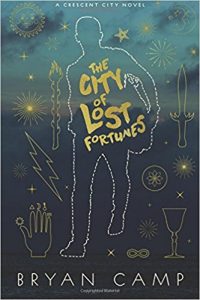Katharine Coldiron Reviews The City of Lost Fortunes by Bryan Camp
 The City of Lost Fortunes, Bryan Camp (Houghton Mifflin Harcourt 978-1-328-81079-3 $24.00, 367pp, hc) April 2018.
The City of Lost Fortunes, Bryan Camp (Houghton Mifflin Harcourt 978-1-328-81079-3 $24.00, 367pp, hc) April 2018.
If Neil Gaiman wrote a post-Katrina novel about New Orleans, it just might be The City of Lost Fortunes. It’s stuffed with more-than-meets-the-mortal-eye cityscapes (Neverwhere), immortal schemes and meddling (American Gods), and historical myth and meaning (Norse Mythology). Although many of the novel’s fantasy elements are relatively familiar, the gumbo made from them by debut author Bryan Camp is new, and the passion with which he writes about his alternate New Orleans is a rare pleasure. It’s a novel of magicians and musicians, bargains and paradoxes, gods – lots of gods – and death. Despite its stumbles, it is an entertaining and promising debut.
Our protagonist, Jude, lives on luck. He’s a squatter with no job and few social connections. His strongest magical gifts are the abilities to find lost things, and to sense loss like a homing signal, particularly through touch. These gifts come from his father, who is unknown to Jude through most of the book, though that conflict feels a little bit limp. The most resonant conflict Jude faces is with his city; after Katrina, the sense of loss that enveloped New Orleans was too much for Jude, and he cut nearly all ties to the world around him so as to suffer less from its loss. The events of the book – primarily, a high-stakes poker game he is forced into with a fortune god, an Egyptian god, a vampire, and an angel – coax him into resurfacing. He must, in a way, put the band back together, to sort out whether he has gambled away his life or the fate of New Orleans itself.
Like heavily patterned wallpaper, the plot of this book is too busy to summarize much farther. The sense is of an author keeping a top spinning quickly enough that an observer can’t read the symbols carved into it. If it slows down at all, the balance might collapse: plot holes might emerge, motivations might be revealed as paper-thin, and shocking twists might be telegraphed. It’s a book with an intricate fantasy world, including a delightfully mixed-up pantheon of gods from myriad religious traditions, but the plot is noisy rather than detailed, and the prose is largely mundane, as transparent as Rowling’s (for many readers, this might be a plus). Camp also owes a significant debt to Jim Butcher. The City of Lost Fortunes is not as strict a mystery as the Dresden books often are, and there are more politically relevant ideas at play, but the deep darkness of the nights in which Camp’s creatures playact as people, the magic which varies in proportion to the needs of the plot, and the layers of metaphysical clockwork that get revealed as Jude moves around in that night are similar.
Unlike Butcher, Camp has an odd tic with his chapter openings, many of which begin with a paragraph of high-handed, abstract discussions of parallel gods and devils in varying cultures. These paragraphs felt unnecessary to the texture of the book and seemed like a desire to show off research. The author’s imagination, without these windy paragraphs, suffices. Especially toward the end of the book, Camp’s fascination with New Orleans becomes the reader’s fascination. There’s a passage on the godhood of cities that transcends the book’s parlor tricks.
Some of the ancient city-gods have been asleep for centuries, places like Byblos and Nin, Samarqand and Ile-Ife. There are other older cities that are still awake, mad old London and reserved Beijing. Jerusalem, who argues with herself in four different voices, and Mexico City, who only answers to the name Tenochtitlan.
Few genre authors build stories around the abstractions in which The City of Lost Fortunes shows the most interest: luck, death, music, and loss. These themes make the book an unusual read. However, two abstractions are used less effectively: paradox and transaction. Jude’s involvement with the pantheon of New Orleans leads to multiple paradoxes that he must resolve before he discovers his fate, but Camp’s capacity to wield paradox is still in chrysalis. An entire book can turn upon a single paradox, and he stacks them up carelessly, like Pringles. Further, it seems as if Jude must strike bargains with every single character he encounters, whether he’s riding Baron Samedi’s streetcar or holding a conversation. It’s as if life in this novel is wholly based on transactions, on tit for tat, rather than genuine human interaction. That’s a wearying way to move through the world. Perhaps this endless transacting is a phenomenon restricted to Jude, or to a novel that is significantly about the legacy of a fortune god, and it will not persist in the further installments of the Crescent City series. I hope so.
For all this novel’s raw qualities, it bears a reasonable amount of subtext. New Orleans emerges as a city of the dead, not just because of its formidable reputation for voodoo, but because of Katrina. The storm looms large. The book is set in 2011, which seems like a convenience rather than an organic choice; smartphones were less widespread then, a fact which makes some parts of the plot simpler to resolve, and the recovery from Katrina was less advanced. Camp emphasizes, to an audience that might not have read Salvage the Bones or Blood Dazzler, that there never was a storm like Katrina, that she split and shook New Orleans like nothing else has or will, that she took the city to the limit of its capacity for pain. Jude is a casualty of that pain, and it’s a pleasure to go along as he claws his way back from invisibility – like an abandoned house, an X spray-painted on the door, finally rebuilt and whole again.
Katharine Coldiron is the author of Ceremonials (Kernpunkt Press), an SPD fiction bestseller. Her work as a book critic has appeared in The Washington Post, The Believer, The Guardian, and many other places. She lives in California and at kcoldiron.com.
This review and more like it in the July 2018 issue of Locus.
 While you are here, please take a moment to support Locus with a one-time or recurring donation. We rely on reader donations to keep the magazine and site going, and would like to keep the site paywall free, but WE NEED YOUR FINANCIAL SUPPORT to continue quality coverage of the science fiction and fantasy field.
While you are here, please take a moment to support Locus with a one-time or recurring donation. We rely on reader donations to keep the magazine and site going, and would like to keep the site paywall free, but WE NEED YOUR FINANCIAL SUPPORT to continue quality coverage of the science fiction and fantasy field.






